|
|
|
Sort Order |
|
|
|
Items / Page
|
|
|
|
|
|
|
| Srl | Item |
| 1 |
ID:
118153
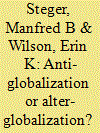

|
|
|
|
|
| Publication |
2012.
|
| Summary/Abstract |
Globalization has unsettled conventional, nationally based political belief systems, opening the door to emerging new global political ideologies. While much analytic focus has been on ideational transformations related to market globalism (neoliberalism), little attention has been given to its growing number of ideological challengers. Drawing on data collected from 45 organizations connected to the World Social Forum, this article examines the political ideas of the global justice movement, the key antagonist to market globalism from the political Left. Employing morphological discourse analysis and quantitative content analysis, the article assesses the ideological coherence of "justice globalism" against Michael Freeden's (1996) three criteria of distinctiveness, context-bound responsiveness, and effective decontestation. We find that justice globalism displays ideological coherence and should be considered a maturing political "alter"-ideology of global significance. The evidence presented in this article suggests the ongoing globalization of the twenty-first-century ideological landscape.
|
|
|
|
|
|
|
|
|
|
|
|
|
|
|
|
| 2 |
ID:
118157
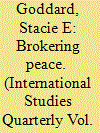

|
|
|
|
|
| Publication |
2012.
|
| Summary/Abstract |
After over 20 years of fighting in Northern Ireland, the Belfast Agreement of 1998 has successfully implemented a power-sharing agreement. Belfast was not the first attempt at a peaceful settlement; indeed, some scholars count as many as seven prior peace attempts in Northern Ireland, the most significant being the Sunningdale Agreement of 1973. Why was it that politicians successfully negotiated the peace in 1998, while these prior attempts failed? Drawing from social network theory, I argue that the Belfast Agreement succeeded, not because of a change of interests or disappearance of spoilers, but because of the presence of brokers at the bargaining table. Brokers, in particular, have the capacity to legitimate settlements-to frame settlements in such a way that they appear consistent with principles held by multiple coalitions. As a result, brokers are both more likely to build a winning coalition for a settlement, as well as marginalize spoilers who seek to undermine the peace.
|
|
|
|
|
|
|
|
|
|
|
|
|
|
|
|
| 3 |
ID:
118155


|
|
|
|
|
| Publication |
2012.
|
| Summary/Abstract |
Capitalism has emerged as a force for peace in studies of interstate conflict. Is capitalism also a force for peace within nations? This article shows how a market-capitalist economy-one where most citizens normally obtain their livelihoods contracting in the market-creates citizen-wide preferences for universal freedom, peace, and the democratic rule of law. Prior research has corroborated the theory's predictions linking market-capitalism with liberal preferences, human rights, and peace among nations. Here, Granger tests of causality show that market-capitalism causes higher income, but higher income does not cause market-capitalism, and from 1961 to 2001 not a single civil war, insurgency, or rebellion occurred in any nation with a market-capitalist economy. Market-capitalism is the strongest variable in the civil conflict literature, and many of the most robust relationships in this literature are spurious-including income, state capacity, and oil-export dependency.
|
|
|
|
|
|
|
|
|
|
|
|
|
|
|
|
| 4 |
ID:
118160
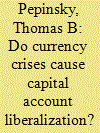

|
|
|
|
|
| Publication |
2012.
|
| Summary/Abstract |
A central argument in the literature on economic crises and policy reform is that currency crises lead governments to liberalize their capital accounts in order to establish their credibility to international markets. I argue that the reverse is true: currency crises lead governments to restrict capital flows as a form of self-help. Using instrumental variables to account for the possibility that capital account liberalization causes currency crises, I show that currency crises are robustly associated with capital account closure across developing countries. The findings refocus the debate on currency crises and capital account liberalization and contribute to larger debates about the role of critical junctures in prompting neoliberal policy reform.
|
|
|
|
|
|
|
|
|
|
|
|
|
|
|
|
| 5 |
ID:
118154


|
|
|
|
|
| Publication |
2012.
|
| Summary/Abstract |
Does democratization pacify states-and thus their respective regions-or does it make them more war-prone? This is both a theoretical issue within the literature on democracy and peace, and an empirical issue, as in some regions democratization led to peace and in others it resulted in violence. To answer the posed question, this study probes the "state-to-nation balance" model as it makes the preliminary argument that democratization is not the underlying cause of either large-scale violence or peacemaking. Democratization, thus, is at best an intervening variable and in some cases has no major effects on war and peace. Rather, it is the state-to-nation balance model that better explains the war- and peace-proneness of states and regions. For an exploratory probe of this argument, the study examines Germany and Iraq-two key powers in their respective regions-and the changes they have gone through since World War I until today. The paper shows that when democratization takes place within a state-to-nation balance, it tends to have stabilizing effects and warms the peace. In contrast, within a state-to-nation imbalance, it is probable that democratization will have destabilizing effects.
|
|
|
|
|
|
|
|
|
|
|
|
|
|
|
|
| 6 |
ID:
118158
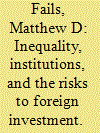

|
|
|
|
|
| Publication |
2012.
|
| Summary/Abstract |
Income inequality is frequently given a central role in explaining diverse political outcomes, but the specifics of how, when, and under what circumstances inequality really matters are far from clear. This paper addresses these questions by examining whether greater levels of inequality raise the risk of expropriation associated with foreign investment. The results demonstrate that inequality matters in two distinct ways. First, inequality elevates risk, although consistent with the argument developed herein, the effect is strongest when chief executives face high constraints on their decision making. Second, inequality mitigates the otherwise protective influence of political institutions on the risk of expropriation. The findings are robust across a variety of estimation strategies, including instrumental variable procedures that correct for error in the measurement of inequality. The findings provide new insights regarding the determinants of foreign investment while simultaneously resolving one part of the contested literature describing inequality's role in the political economy of development.
|
|
|
|
|
|
|
|
|
|
|
|
|
|
|
|
| 7 |
ID:
118159
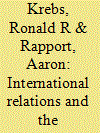

|
|
|
|
|
| Publication |
2012.
|
| Summary/Abstract |
Theories of international relations have often incorporated assumptions about time horizons-a metaphor for how heavily actors value the future relative to the present. However, they have not built on a growing body of experimental research that studies how human beings actually make intertemporal tradeoffs. In this article, we present relevant findings from psychology and behavioral economics, notably those of "construal level theory" (CLT), and explore these findings' implications for three classic questions-international cooperation, preventive war, and coercion. We argue that experimental evidence regarding how people discount future value and construe future events challenges the conventional wisdom on international cooperation. We further maintain that CLT helps explain a longstanding puzzle about preventive wars-namely why they are often initiated too late by declining powers but too soon by rising competitors. Finally, we rely on these findings to explain who wins coercive contests and why compellence is often, but not always, harder than deterrence. Scholars of international relations often embed in their theories crucial assumptions about time horizons, and this article seeks to show what differences it makes if we ground these assumptions in what we know about actual human decision making.
|
|
|
|
|
|
|
|
|
|
|
|
|
|
|
|
| 8 |
ID:
118162


|
|
|
|
|
| Publication |
2012.
|
| Summary/Abstract |
This study tests the effectiveness of naming and shaming by transnational advocacy networks in reducing the severity of ongoing instances of genocide or politicide. I argue that naming and shaming should force perpetrators to reduce the severity of these ongoing atrocities in order to shift the spotlight, save their reputation, reframe their identity, maintain international legitimacy and domestic viability, and ease pressure placed on them by states or IOs. I test whether naming and shaming by NGOs, the media, and IOs significantly reduces the severity of the killing. Ordered logit analyses of ongoing genocides and politicides from 1976 to 2008 reveal that naming and shaming by Amnesty International, the Northern media, and the UNCHR have significant ameliorative effects on the severity of the most extreme atrocities. Transnational advocacy networks have the potential, through naming and shaming, to lead to life-saving changes in these murderous policies.
|
|
|
|
|
|
|
|
|
|
|
|
|
|
|
|
| 9 |
ID:
118156


|
|
|
|
|
| Publication |
2012.
|
| Summary/Abstract |
What are the sources of popular opposition to economic globalization? A common answer in the literature is the adverse impact of trade liberalization on some people's labor market standing and earning prospects. Recent studies also note a correlation between nationalist and ethnocentric sentiments and support for trade protectionism, yet do not test whether these non-economic sentiments are actually a cause of the opposition to freer trade. I argue that many individuals fear not only the oft-cited material consequences of trade openness, but also what they perceive to be its social and cultural consequences. I use cross-national survey data and a survey experiment to test this causal claim. The argument also helps explain why less-educated individuals are consistently more apprehensive about international economic integration than more educated individuals, even in the countries in which economic theory predicts otherwise. The findings have implications for the debate over the policy tools for compensating globalization's losers and sustaining popular support for further economic integration.
|
|
|
|
|
|
|
|
|
|
|
|
|
|
|
|
| 10 |
ID:
118166
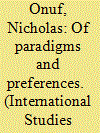

|
|
|
| 11 |
ID:
118161


|
|
|
|
|
| Publication |
2012.
|
| Summary/Abstract |
What counts as evidence that the other side is sincere? Within mainstream international relations literature, scholars have focused on costly signals. We argue, however, that in the real world leaders do not simply look at costly signals, but they rely to an important extent on their personal impressions of other leaders, taking these as credible indicators of sincerity. Our approach thus builds both upon the literature on interstate communication and perceptions and upon more recent research in the field of neuroscience regarding affective information. To probe the plausibility of our theory, we focus on the indicators British Prime Minister Neville Chamberlain used to evaluate Germany sincerity in the late 1930s and Ronald Reagan employed to make sincerity judgments about Soviet intentions in the late 1980s. Additionally, we briefly discuss the 1961 Vienna Summit between Kennedy and Khrushchev as an illustration of how personal impressions can also result in negative assessments of sincerity. Our findings suggest that personal impressions are an important, but up until now relatively ignored, source of evidence for leaders of their counterparts' sincerity with significant implications for threat assessments and policy choices.
|
|
|
|
|
|
|
|
|
|
|
|
|
|
|
|
| 12 |
ID:
118163
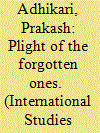

|
|
|
|
|
| Publication |
2012.
|
| Summary/Abstract |
Adding value to existing aggregate cross-national analyses on forced migration, I use subnational-level data to investigate circumstances that affect people's decisions of whether or not to flee their homes during civilian conflicts. Building on existing literature, I argue that conflict by itself is not the sole factor affecting people's decisions to flee or stay. Apart from a direct physical impact, civil war can destroy economic infrastructure and expose people to economic hardships, which can contribute to displacement. In addition, flight may be impeded or facilitated by such factors as geographical features, physical infrastructure, and social conditions under which people live. Using count data from the Maoists "people's war" in Nepal, a subnational analysis of displacement is conducted to provide a more refined test of existing large-n studies on the causes of forced migration. The empirical results are consistent with the major hypotheses developed in the field. With more precise measures of conflict, economic and physical conditions, and presence of social networks, I demonstrate the importance of a rationalist framework in understanding the choice of flight.
|
|
|
|
|
|
|
|
|
|
|
|
|
|
|
|
| 13 |
ID:
118165
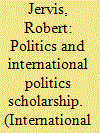

|
|
|
| 14 |
ID:
118164
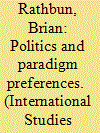

|
|
|
|
|
| Publication |
2012.
|
| Summary/Abstract |
Are international relations scholars objective observers of political events, or do our political preferences influence the way in which we see the world? This article explores that question using data from a survey of international relations scholars. It develops and tests hypotheses about how we might expect adherents of particular paradigms to identify themselves politically on a left-right scale based on the resonance between the content of ideology and the key propositions of different schools of thought in IR. Although they are relatively centrist, I find that realists are the most conservative and right-leaning of international relations scholars, while Liberals are more liberal and left-leaning. Although neither approach has any intrinsic ontological content, rationalism and constructivism also have a distinct ideological profile, the former being more conservative than the latter. Post-positivist epistemological commitments are associated with the political left. More importantly, there is an interaction between ontology and epistemology. Positivism plays a role in breaking the link between political values and paradigm choice. Nonpositivists demonstrate the strongest connection between ideology and international relations approach. I consider the implications of these findings for the use of paradigms in international relations theorizing, arguing that they should make us more circumspect about the use of paradigms in our discipline.
|
|
|
|
|
|
|
|
|
|
|
|
|
|
|
|
|
|
|
|
|